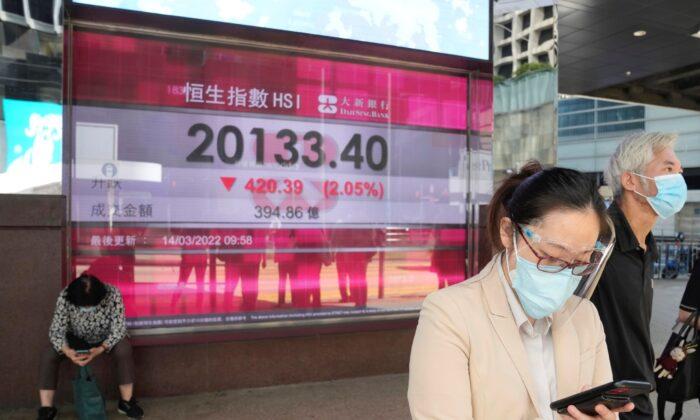BANGKOK—Shares rose in Europe after a mixed session in Asia on Monday, where Hong Kong’s Hang Seng index sank 5 percent after the neighboring city of Shenzhen was ordered into a shutdown to combat China’s worst COVID-19 outbreak in two years.
Benchmarks rose in Frankfurt, Paris, and Tokyo and U.S. futures were higher. Oil prices retreated against the backdrop of uncertainty from the war in Ukraine.
Germany’s DAX advanced 2.8 percent to 14,003.93, while the CAC 40 in Paris picked up 1.7 percent to 6,367.58. Britain’s FTSE 100 gained 0.3 percent to 7,178.48.
The future for the Dow Jones Industrial Average rose 1 percent, auguring a positive start for the week’s trading. The S&P 500 future was 0.7 percent higher.
The spreading virus outbreaks in China are compounding worries over supply chain disruptions both from the pandemic and from the war.
A vital manufacturing and technology hub of 17.5 million people, Shenzhen is home to some of China’s most prominent companies, including telecom equipment maker Huawei Technologies Ltd., electric car brand BYD Auto, Ping An Insurance Co., and Tencent Holding, operator of the WeChat message service.
Foxconn, supplier to Apple and other electronics brands, said it had suspended factory lines in Shenzhen due to the shutdown. In a notice to Taiwan’s stock exchange, its listed company Hon Hai Precision Industry, the world’s largest contract manufacturing company, said it did not expect the suspension to have a major impact on its business.
Hon Hai shares lost 1 percent on Monday.
The Hang Seng index dipped 5.4 percent but regained some lost ground to close 5 percent lower at 19,531.66. The exchange’s tech index dropped 11 percent.
The Shanghai Composite index slipped 2.6 percent to 3,223.53. The A-share index in Shenzhen’s smaller market lost 2.9 percent.
Infection numbers in mainland China are low compared with other countries and with Hong Kong, which reported more than 32,000 new cases Sunday. But Beijing’s “zero tolerance” strategy has led to lockdowns of entire cities to find and isolate every infected person.
In other Asian markets, Tokyo’s Nikkei 225 index rose 0.6 percent to 25,307.85 and the S&P/ASX 200 in Australia gained 1.2 percent to 7,149.40. South Korea’s Kospi lost 0.6 percent to 2,645.65.
The Ukraine crisis and central bank efforts to fight inflation remain the focus for most markets.
Russia’s military forces were keeping up their campaign to capture Ukraine’s capital as residents of other besieged cities held out hope that renewed diplomatic talks might open the way for more civilians to evacuate or emergency supplies to reach them.
A fourth round of talks began on Monday between Ukrainian and Russian officials.
On Friday, the S&P 500 fell 1.3 percent, and the Dow industrials lost 0.7 percent. The Nasdaq composite index gave up 2.2 percent and the Russell 2000 index of smaller companies slipped 1.6 percent.
World markets have been rocked by dramatic reversals as investors struggle to guess how Russia’s invasion of Ukraine will affect prices of oil, wheat, and other commodities produced in the region.
That’s raising the risk the U.S. economy may struggle under a toxic combination of persistently high inflation and stagnating growth. The Federal Reserve is expected to raise interest rates at its meeting this week as it and other central banks act to stamp out the highest inflation in generations, while trying to avoid causing a recession by raising rates too high or too quickly.
U.S. stocks are about 10 percent below peaks hit earlier this year, while crude oil prices are more than 40 percent higher for 2022.
U.S. benchmark crude oil lost $6.51 to $102.82 per barrel in electronic trading on the New York Mercantile Exchange. It surged $3.31 per barrel on Friday to $109.33 per barrel.
Brent crude oil, the standard for international pricing, declined $5.40 to $107.27 per barrel.
The U.S. dollar rose to 118.02 Japanese yen from 117.35 yen. The euro strengthened to $1.0952 from $1.0926.





